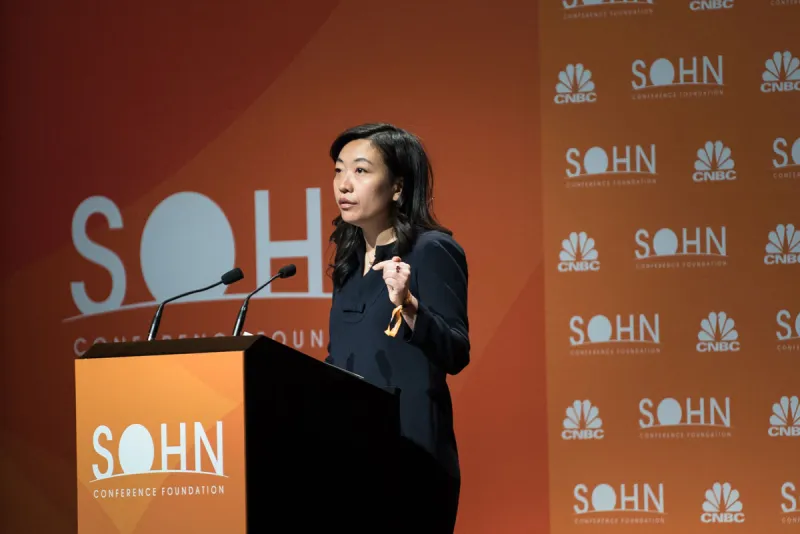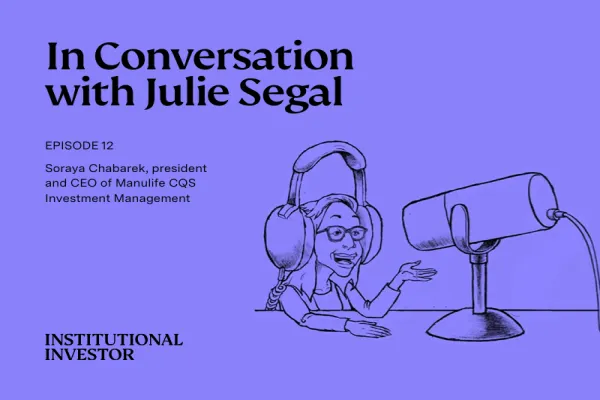
Li Ran, chief investment officer of Half Sky Capital, speaks at the 2018 Sohn Investment Conference.
(Kholood Eid/Bloomberg)
The hedge fund industry may want to listen closely to the younger crowd as it seeks ideas that will build on its best performance in a decade.
Many of the “next wave” hedge fund managers invited to pitch ideas at the annual Sohn Investment Conference in New York have presented stocks that rose more than 30 percent over the following 12 months, a review by Institutional Investor found. Picks from Will Snellings of Marianas Fund Management, Oleg Nodelman of EcoR1 Capital, and David Rosen of Rubric Capital Management were among the biggest winners over that time frame.
Sohn began introducing next wave investors in 2014, setting the stage for the hedge fund industry’s rising stars to share their actionable ideas alongside high-profile managers like billionaire Leon Cooperman. After several years of lagging hedge fund performance, managers still have room in 2019 to show investors the industry can accelerate its comeback in volatile markets.
“Everyone is looking for the next individual that can present and execute that great idea,” says Sasha Jensen, chief executive officer of recruiting firm Jensen Partners. “Now is the time for niche players to come forward into the long night.”
Hedge funds gained 7.6 percent during the first six months of this year, the best first half since 2009, according to Hedge Fund Research president Ken Heinz. While a welcomed rebound from a 4.75 percent loss in all of 2018, the hedge fund industry has trailed the stock market and is under pressure to live up to the fees they charge investors.
The S&P 500 index, for example, gained about 17 percent during the first half of 2019. But over the past five years, many young hedge fund managers presenting at Sohn have proved a bright spot for the industry — at least temporarily.
For example, Snellings, who was among the first crop of New York’s Next Wave Sohn presenters in 2014, pitched JetBlue Airways Corp. in May of that year. Over the next 12 months, the airline’s shares soared 161 percent to about $21. Snellings, the founder of Marianas, did not return phone calls seeking comment.
More recently, Nodelman and Rosen raised their profiles as up-and-coming hedge fund managers at Sohn.
Nodelman, the founder of EcoR1 whom II named a hedge fund rising star in 2015, took to the Sohn stage last year to present Ascendis Pharma as an investment idea. Shares of the Copenhagen-based biopharmaceutical company climbed 76 percent over the next year to about $112. EcoR1, which focuses on investments in biotechnology, declined to comment.
Rosen, who launched Rubric Capital Management as an independent firm in 2016, pitched Kraton Corp. to Sohn’s audience that same year. The Houston-based company’s shares increased 47.5 percent over the next year to about $33. Rosen did not return phone calls seeking comment.
Shares of the company’s parent, Alphabet, increased 29 percent over the following year even as the stock market declined in the same period. The S&P 500 index, for example, declined about 3 percent in the 12 months through May 4, 2016.
Cooperman — the legendary stock picker who at the end of last year converted his hedge fund firm to a family office — did not return phone calls seeking comment. Cooperman is scheduled to speak this month at the Delivering Alpha conference hosted by II and CNBC in New York, joining a discussion on ways to beat benchmarks in a world where the rise of passive investing has prompted concern that traditional stock picking is in demise.
Jensen Partners, for example, has seen a slowdown in hiring for marketing roles such as business development and investor relations. During the first half of this year, the recruiting firm tracked 99 marketing staff moves among hedge funds, down 42 percent from the first half of 2018.
“The industry has taken a hit across the board,” says Jensen, explaining the drop is partly due to hedge fund firms adjusting to a difficult macro environment in 2018. This year, they’ve continued to navigate trade tensions between the U.S. and China, as well as questions surrounding interest rates as President Donald Trump pressures the Federal Reserve to lower them to keep the stock market rising.
It’s been just a few months since this year’s Next Wave Sohn speakers delivered their stock ideas, but as recently as August 8, their long bets had dropped in price, according to II’s review. Of course, stocks that don’t do well soon after they are pitched could have stellar performance over the longer term.
Take Alex Denner, founder of activist hedge fund Sarissa Capital Management, who presented Ariad Pharmaceuticals as a stock pick at New York’s Next Wave Sohn conference in 2015. Ariad’s stock declined over the next year before soaring on news it was being acquired by Japan’s Takeda Pharmaceutical Co. for $24 a share in 2017.
Sarissa — which seeks to identify undervalued health-care companies that can benefit from its technical and operational expertise — disclosed in a 2013 filing that it had accumulated a more than six percent stake in Ariad by purchasing about 11.5 million shares at $2.77 to $5.47 each. The Greenwich, Connecticut-based hedge fund firm declined to comment on its total profit from the investment.
More than a third of the “next wave” managers pitching at Sohn in New York from 2014 to 2018 have presented long bets that rose more than 30 percent over the next year, according to II’s review. A majority of these bets were in companies based outside the U.S., including about a quarter based in emerging markets, II found.
“Alternative investment firms are broadening their horizons in an attempt to reach new investors, and therefore new capital,” Jensen Partners said in its first-quarter newsletter. “We’ve noticed strong interest in gaining access to the booming Asian market, which may soon rival Western countries in wealth.”
Investors in hedge funds aren’t exactly enthusiastic about the industry — despite their best performance in a decade during the first six months of this year. Forty-six percent of hedge fund investors surveyed by Preqin said that performance had fallen short of their expectations over the past year, according to a report released August 27 by the alternative-assets data provider.
It’ll take more than a few great stock picks at 2020’s Sohn conference to propel the hedge fund industry, but they’re sure to be highly anticipated. Meanwhile, Heinz sees up-and-comers raising the game by developing new approaches to investing, including differentiated quantitative strategies driven by computer algorithms.
“Younger managers have done a good job at generating investor interest in newer areas,” he says.





